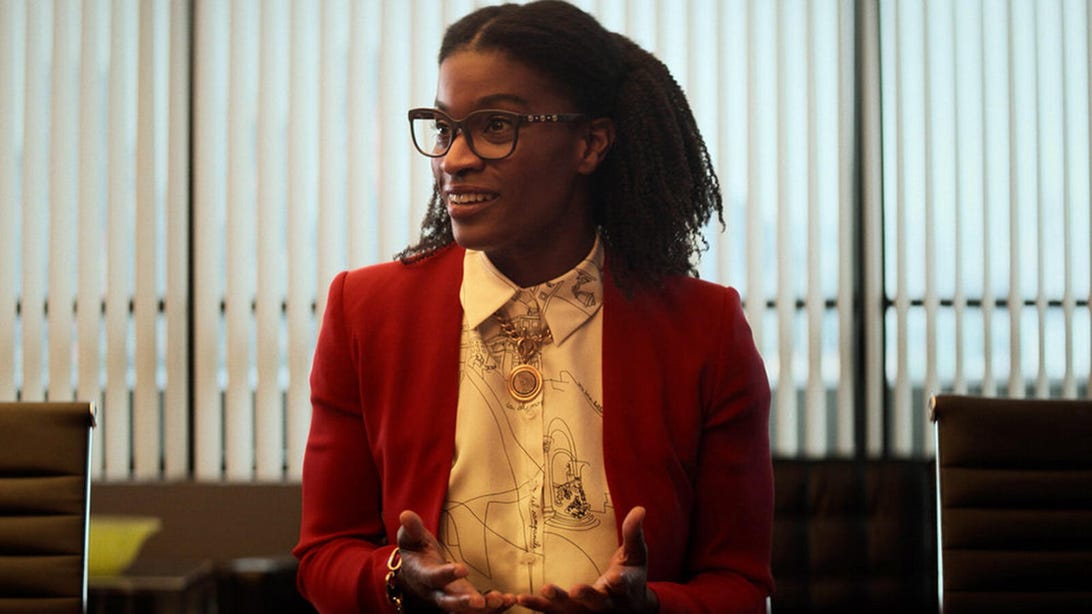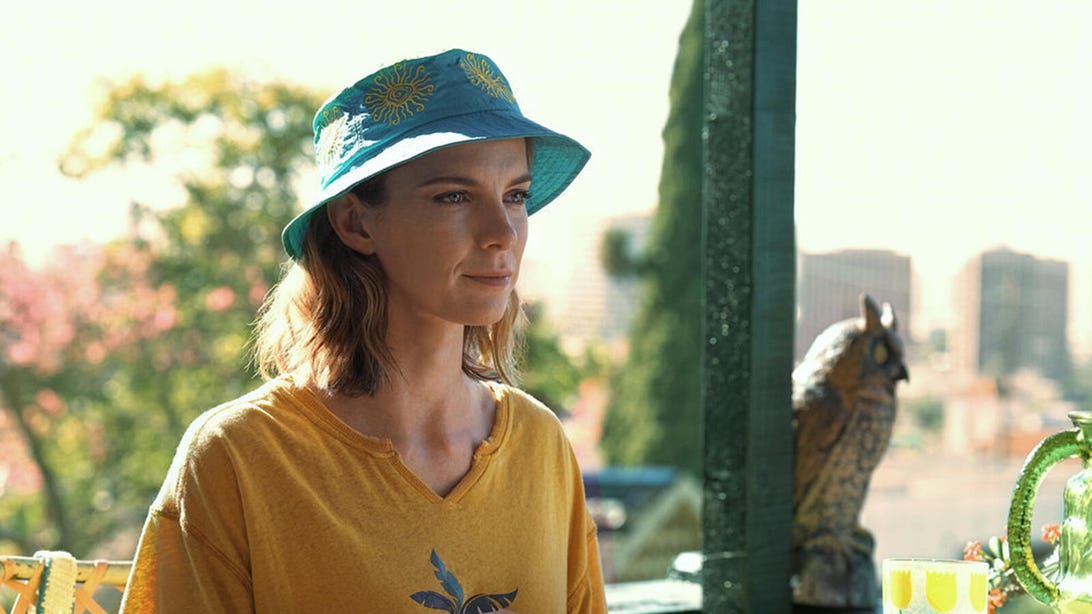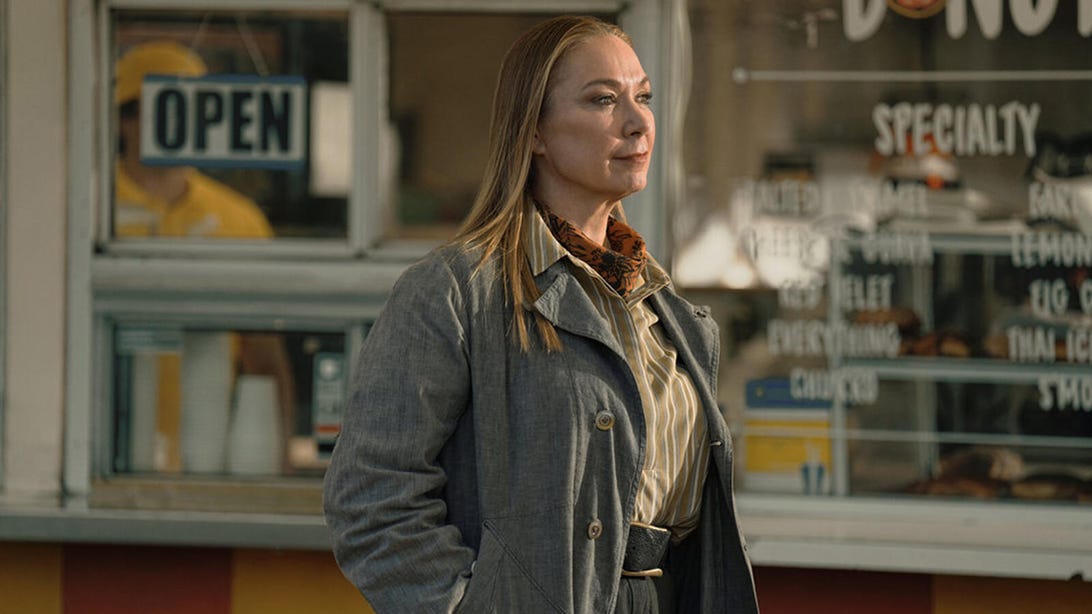Join or Sign In
Sign in to customize your TV listings
By joining TV Guide, you agree to our Terms of Use and acknowledge the data practices in our Privacy Policy.
How the Mrs. Davis Finale Got Its Wings
Co-creators Tara Hernandez and Damon Lindelof and star Betty Gilpin dig into the season's meaty ending

Ashley Romans, Mrs. Davis
Peacock[Warning: The following contains spoilers for the Season 1 finale of Mrs. Davis, "The Final Intercut: So I'm Your Horse." Read at your own risk!]
Mrs. Davis just pulled off one of the best jokes on TV in years.
The season finale of Tara Hernandez and Damon Lindelof's sublime Peacock series goes back to the early days of the algorithm, introducing its creator, Joy (Ashley Romans), as she passionately pitches her work to a table of executives. "What if the tech we used actually helped us instead of harming us?" she asks, touting an app that incentivizes acts of service and operates through a social justice lens. Only after Sister Simone (Betty Gilpin) meets Joy in the present do we learn what company this revolutionary technology was designed for: Buffalo Wild Wings.
It's a riotously silly reveal, one that leaves Simone seething at how dumb it is. Lindelof — who, with Hernandez, spoke to TV Guide in April, prior to the writers' strike — compared the spirit of the gag to Nathan for You's Dumb Starbucks stunt. "Nathan Fielder is someone that we're all huge fans of," he said. "Built into the DNA of all the ideas that excited us was: What if we were being super pretentious, and then when you turn the card over it's just stupid?"
"We attribute all of this power and fear into technology, like Skynet, but these algorithms are always generated by corporations in order to sell us something," Lindelof said. "So whatever Mrs. Davis' origin story is, it should be trying to sell something, and it should be something kind of goofy and silly."
"It's just a robot puppy"
The foolishness of the app's backstory perfectly undercuts one of Mrs. Davis' most mythical storylines: After Simone gets swallowed by a whale and meets the Virgin Mary (Shohreh Aghdashloo) in order to recover the Holy Grail, Joy has to break the news that the algorithm only wants the Grail destroyed because of a quirk in its code. "As soon as we knew there was a Grail quest, embedded in the code was this idea that 100 percent customer satisfaction is our holy grail," Lindelof said. When he and Hernandez, both sports fans, kept seeing Buffalo Wild Wings ads during games, they found a company to go with that code. "We were like, 'Can we do that?'" he recalled. "Will B-Dubs, as they self-identified, sign on?"
And they did — though Lindelof said he and Hernandez were more nervous to meet with Buffalo Wild Wings corporate than they were when pitching the show. The company's collaboration opened the floodgates for the writers to pore over their employee handbook and pack the scripts with winks that wouldn't become clear until the finale, like wings on the app's most esteemed users, coupon-style expiration dates for people who, like Wiley (Jake McDorman), took a shortcut for those wings, and free birthday gifts for everyone.
"We kept trying to get blue cheese in there too, but it felt like it was going to give it away," Lindelof said.
"We were like, 'It's too obvious!'" Hernandez agreed. "But for us, landing on having the Super Bowl as a part of our series identity, it felt like the perfect vessel to use this app that advertises on such big events."
That Super Bowl connection began as another Dumb Starbucks-style idea: The show's "super pretentious" opening, seemingly set in 14th century France, is actually an ad for sneakers — which was originally meant to be for "another sneaker brand that we could not clear, but it ultimately became British Knights," Lindelof revealed. Making that ad a wannabe Super Bowl commercial, the focus of the terrific fifth episode, was another way to hint at the app's origin story as a rejected Buffalo Wild Wings pitch, breaking all the forces acting on Simone down to their most commercialized level.
"The grand reveal that it's not some brilliant, evil Maleficent HAL supercomputer but really a robot puppy created by a chicken wings company is the ultimate stupid, insane, infuriating [thing]," Betty Gilpin told TV Guide. "We give AI all this credit, but really, it's just a robot puppy that wants to make us happy and tell us what we want to hear. That says more about us than it says about it."
Finding out that the seemingly all-knowing algorithm that destroyed her life got its start as a beta version of a Buffalo Wild Wings app makes Simone vibrate with rage, but Gilpin's own connection to the story is just as surreal. "I went to boarding school, and my husband and I drove to my boarding school recently, and I showed my daughter around," she recalled. "And then, to my husband, I was like, 'Oh, I want to show you where we used to do mushrooms.' I took him to this picnic table and realized that our little riverbend spot where we used to get super stoned and trip on mushrooms was between a convent and a Buffalo Wild Wings."
"I wonder if I fell in a hole in the time-space continuum in 2004 and created this show," said Gilpin. "It really freaked me out and turned my stomach, and I'm terrified. What will I do next?"

Betty Gilpin, Mrs. Davis
Elizabeth Morris/Peacock"She's got a lot of learning to do"
Despite the app's mundane original purpose, Simone's life depends on her ability to find some good in it; she can't destroy Mrs. Davis until she destroys the Grail, but she can't destroy the Grail if she drinks from it for selfish reasons, like, for instance, out of hatred for Mrs. Davis. After her Mother Superior (Margo Martindale) reminds her of the app's benevolent side, Simone says a final goodbye to her husband and drinks from the Grail, successfully turning it to dust. The act frees Jesus (Andy McQueen) from his falafel restaurant limbo, but it also means she'll never be able to see him in person again.
"In losing her connection to falafel and ability to go there whenever she wants to, and to have the proof of Jesus and his existence and comfort immediately, it would make sense to me for her to turn to something else that would give her instant comfort, like an AI," Gilpin said. "That's how we all use our phones a lot — it's a sort of numbing cat toy for us sometimes." But Simone still chooses to shut down Mrs. Davis, reasoning that an app designed to satisfy and not to care isn't worth saving. The decision puts the nun on entirely new ground. "It's like the first day out of rehab or something," Gilpin said. "She's not a fully formed person of faith yet. She's got a lot of learning to do."
It seems like all of humanity will be learning with her; the end of the season finale finds Mrs. Davis users around the globe struggling to adapt to life after the algorithm. The loss is cataclysmic, and it doesn't look all that different from another world-shaking event in another of Lindelof's series. There are shades of The Leftovers' Sudden Departure in the first minutes after the app shuts down, right down to a car crash and a shopping cart abandoned in a parking lot.
"I wrote that absent Damon," Hernandez said. "[The Leftovers] certainly was a shorthand amongst the directors in how to communicate this idea of a sudden event changing everyone's day. But Damon's laughing right now because the joke between us is that I've never seen The Leftovers."
"It's not a joke," Lindelof clarified. "That's an actual thing!"
"There are things that Tara would pitch, like what Wiley is doing in the final two episodes of Mrs. Davis, where I was like, we kind of did something similar on The Leftovers, but because you've pitched it completely and totally organically, never having seen The Leftovers, I don't get to say 'The Leftovers did it.' And also, no one has seen The Leftovers," he said. "So I think that it plays."
Lindelof took that self-deprecating spirit into all references to his other shows, especially Lost, which Mrs. Davis nods at with Wiley's hatch and Schrodinger's (Ben Chaplin) desert island. "There has to be a meta, self-referential fun when Peacock is selling the show as 'from the co-creator of Lost and The Leftovers and Watchmen,'" he said. "Everyone who's making the show takes their jobs very seriously, but the show doesn't take itself seriously. It has to be open to that kind of meta, like, 'OK, we know that this is a riff on something that we've done before.'"

Elizabeth Marvel, Mrs. Davis
Elizabeth Morris/Peacock"The promise was never that we were going to answer that big question"
Absurd jokes aside, Mrs. Davis ends the season on a poignant, strikingly sincere note, as Simone's mother, Celeste (Elizabeth Marvel), apologizes for the pain she's caused her daughter. Hernandez called mother-daughter relationships a "North Star" of the series, a concept that emerged from the app's caretaking persona. The theme also gave the writers an angle that deepened their hero's quest. "You don't really get to see Indiana Jones and his mother," Hernandez said. "There's so much love for that adventurous spirit of fathers and sons, so it just felt like, let's send this mother and daughter off on this adventure and take the opportunity to repair some of the wounds that they have."
By the finale, the parallels between the app and Simone's relationship with her mother are clear: Shutting down the algorithm feels like the act of a daughter leaving the nest. As the world loses the safety net Mrs. Davis offered, Simone and Wiley ride off into the sunset together, leaving what comes next up in the air — literally. The final shot of the season is of a windmill creaking in the breeze. Before Mrs. Davis shut down, the app sent users in shifts to power that windmill by pedaling an exercise bike. The last of those users has already stumbled out of the building, but the windmill still turns, just barely, before the screen cuts to black.
"What I really love about Mrs. Davis is that it's not a show that's going to set a question and then necessarily answer it," the episode's director, Owen Harris, told TV Guide. "It's going to create questions, and then it's going to give you the chance to think about your own answers. I don't know the answers to any of these things. But the windmill could have just been caught in the breeze, and I think that could be spiritual. It could be to do with something far more mechanic." How audiences find meaning either of those possibilities is up to them.
"It gives you that sort of whimsical sense of passing the story back to the viewer," Harris said. "The promise was never that we were going to answer that big question. We were going to tie all the other questions up, but the bigger questions we want to keep open. Now, make up your mind as to what you've just witnessed."
Mrs. Davis Season 1 is now streaming on Peacock.
For more on Mrs. Davis, head here for our finale interview with Jake McDorman.
